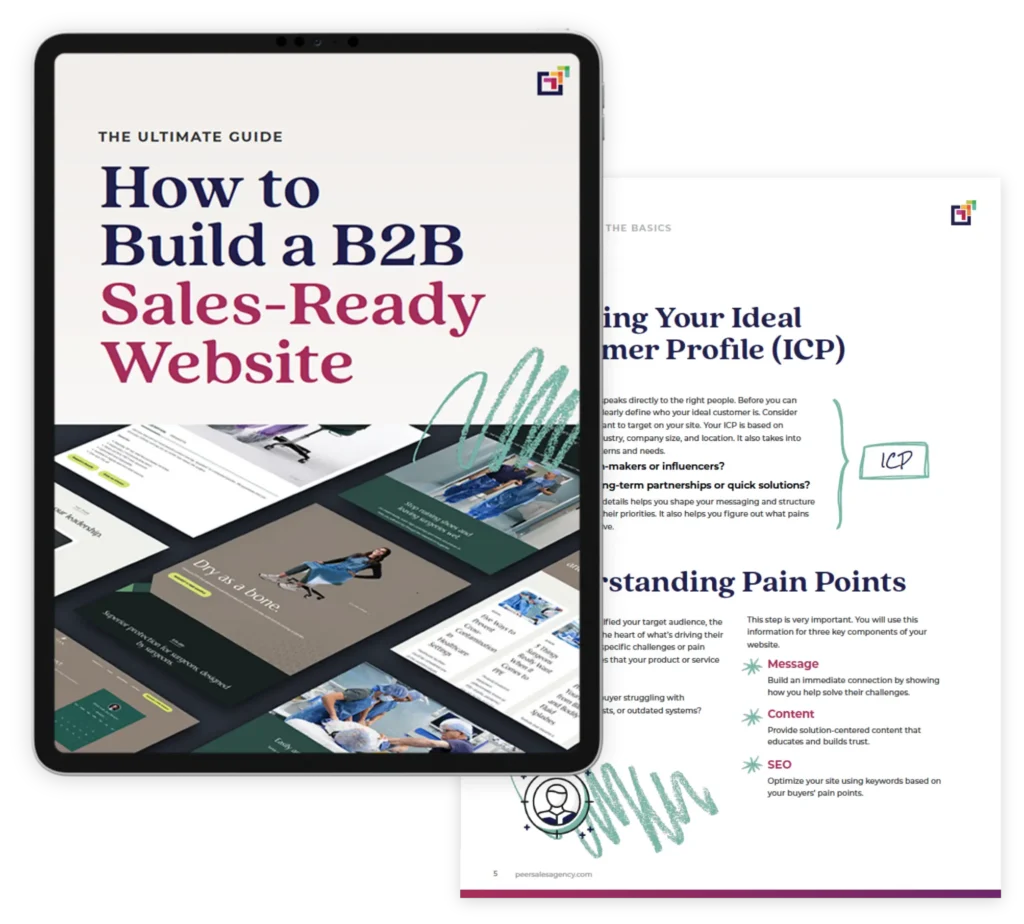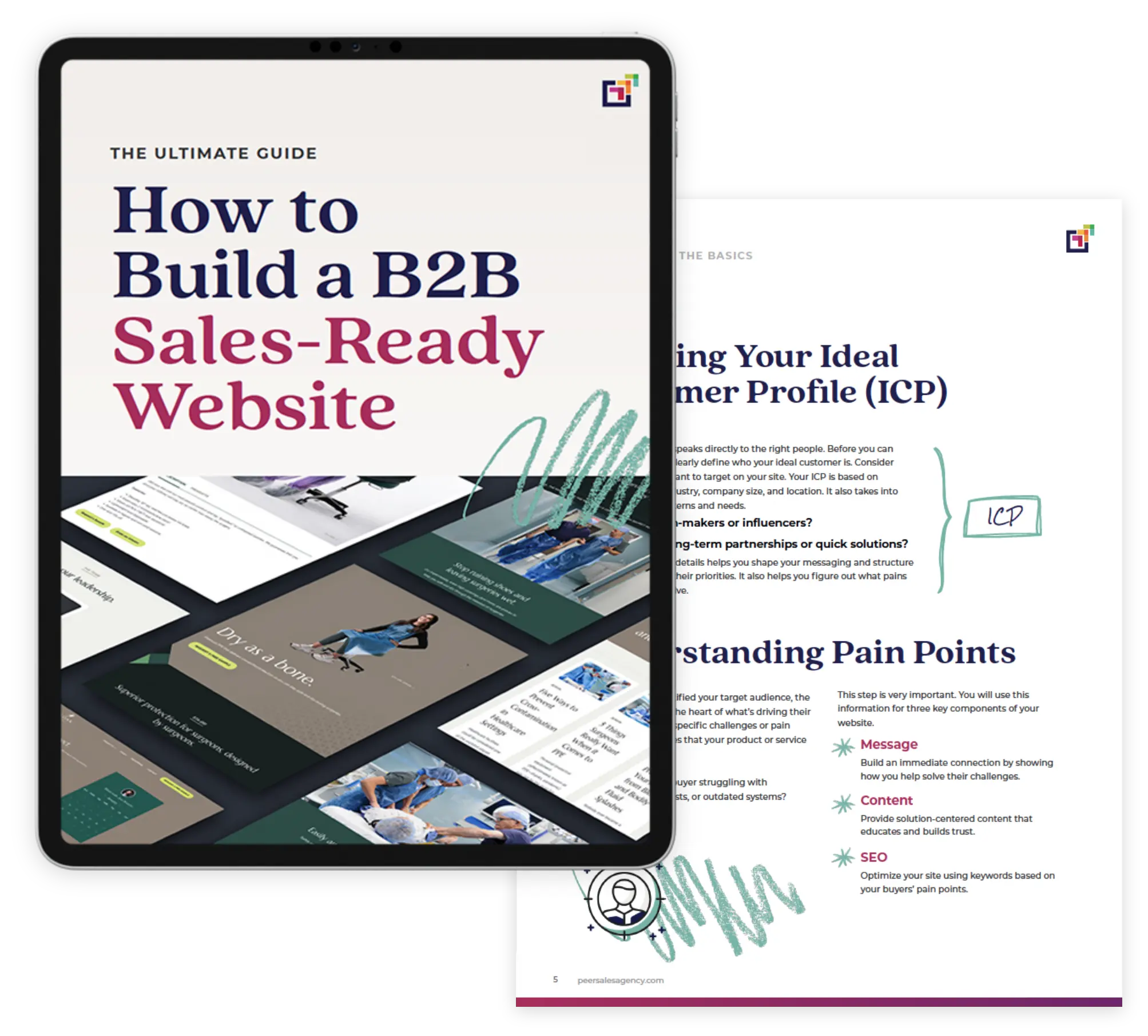If you’re here, I’m sure you’re wondering what questions to ask a B2B website design agency before you sign that contract or proposal they sent over.
Choosing the right B2B website design agency is the all-important first step to launching (or relaunching!) your brand’s web presence. Your website is often the first impression potential clients have of your business. It has to get everything right and make a big impact if your company wants to compete.
Before you sign any website design agency’s proposal, asking the right questions can help you make sure you’re making the right choice. Knowing what to expect from a website design partner also helps you build a strong relationship—and a successful website.
In this article, we’ll discuss 11 essential questions to ask before you sign a contract. These questions will cover foundational, creative, and strategic areas. They’ll ensure you select an agency that meets your unique requirements and adheres to B2B website best practices.
Foundational Questions for a B2B Website Design Agency
Start with these basics to get a sense of the agency’s experience and capabilities. These foundational questions help you understand the agency’s background, team, and previous work.
You’ll want to learn about their experience with B2B clients. Ask them about their typical client engagements and if they have experience in your industry. Understanding their foundation will help you gauge their ability to handle your B2B website needs.
Don’t forget to ask for case studies and testimonials so you can see how their work plays out in the real world. Then, ask these three questions:
What will be included in my B2B website?
Your B2B website needs specific components to be effective. It should start with a clean and intuitive homepage. This is where first impressions are made. Then, add on the pages that make sense for your business:
- Your “Products” or “Services” should be divided into clear, easy-to-understand pages, and these pages should clearly outline what you offer.
- Data-driven decision-makers appreciate a “Resources” page filled with white papers and informative content.
- A “Success Stories” type page can showcase client testimonials and case studies.
- Don’t forget a “Contact Us” page, making it easy for potential customers to reach out.
- Consider including an “About Us” page to share your company’s story and mission.
- Pricing pages are increasingly essential for B2B decision-makers who are working within tightly defined budgets. If your site doesn’t explicitly give pricing, buyers may assume you’re too expensive and churn out of the funnel before you ever get a chance to make your case!
These common pages ensure that your website supports user engagement and efficiently guides visitors through the buying journey.
How long will it take to develop a B2B website?
Creating a B2B website is not an overnight task. It often takes between 90 to 115 days to complete from start to finish.
This timeline allows for thorough research into your messaging and persona. It gives time for correct branding, thoughtful design, and technically sound development.
It also builds in time for your feedback and review so that you and your B2B website design agency partner know that you’re developing a site that truly matches your brand identity.
Since this site needs to resonate with your target audience, time is spent refining the details. Coordinating with your agency will help ensure that the website not only looks good but serves its purpose effectively. Remember, quality takes time!
How much does it cost to build a website?
Building a B2B website is a considerable investment, often starting at around $20,000, because you’ll need to build a sales-ready website, not just an online brochure if you want to earn a return on your investment.
This may seem steep compared to creating a B2C or personal website. However, the complexity of development and volume of content requires a larger budget. A B2B website needs to address longer sales cycles and feature valuable content that speaks to your persona’s business objectives. The cost ensures that you get a site that’s both functional and visually appealing. With the right design agency, your investment pays off in a website that boosts your online presence and supports your marketing strategy.
Your website should earn ROI within 6 months.
How will this B2B website help me hit my revenue targets?
A well-designed B2B website can significantly impact your bottom line. It should be set up to help you reach revenue goals by converting visitors into leads and leads into clients.
93% of B2B purchases start with an online search. And 70-90% of the buyer’s journey is completed before prospects ever contact a salesperson. If your website isn’t built to facilitate the buying process, you’re likely losing out to the competition.
The website should guide potential customers through the buying journey. It should use design elements that highlight your B2B product or service benefits. When speaking with the agency, explore how they optimize content strategy and structure sales funnels. An effective website will push your business closer to achieving its financial objectives.
Creative Process Questions for a B2B Website Design Agency
Understanding the creative process is vital for any B2B web design project. These questions delve into how an agency turns ideas into reality. Ask how they approach the design process and encourage user engagement. Find out how they ensure the design speaks directly to your target audience. You’ll want an agency that can translate your vision into an attractive and functional site.
Be sure to ask these four questions:
How do you write my B2B website?
Every B2B website project should kick off with a messaging and envisioning session.
Here, both your team and the creative team define your brand’s core message, differentiators, offers, and the problems you solve. This session is crucial. It ensures everyone is on the same page. The resulting document, often called a messaging matrix, serves as a foundational guide for the development of your website and any assets connected to it, like case studies and downloadables or whitepapers.
This matrix helps in creating your website’s copy, making sure it speaks directly to your audience’s needs and highlights your unique offerings.
How much input will we get to have?
You should have a collaborative role in the website creation process.
This begins with the messaging session, which should include all key stakeholders from your company and a creative facilitator from the agency.
Your team’s insights are valuable, and you should review and suggest changes to this messaging matrix when it is released. You also have the final approval.
As the project progresses, you should expect to have input at several stages: copywriting and wireframing (where wireframing involves creating a basic outline of your website’s layout), design, quality assurance (also called QA, which is the process of testing the website to ensure it works correctly), and before the official launch.
Will my B2B website use content marketing strategies?
Content marketing strategies are essential for B2B websites.
Tactically, this includes include blogs, resource sections, case studies, downloads, and guides. Content marketing involves creating valuable, relevant content to attract potential customers. On average, B2B decision-makers read at least 13-18 pieces of content before reaching out to sales teams. Our own portfolio of research shows that B2B buyers also need to interact with your brand in some way up to 50 times before they reach out to sales, so having a multi-channel presence that leads back to your website is also essential.
High-quality content is more important than high-volume content, especially in the era of AI overviews in search. Google’s John Mueller says he’s fine with seeing low-quality content on websites because, in his words, it means he can ignore that content—and the brand entirely. “I know I can ignore the article that they ignored while writing [it.] And, why not block them on social too.”
Content marketing strategies establish your site as an industry leader and help guide potential clients through the buying journey, providing them with the information they need to make informed decisions. Don’t skimp on the content—and don’t phone it in, either.
Do you have designers, developers, and writers with B2B experience?
It’s vital for a B2B website design agency to have experts with B2B experience. Designers, developers, and writers play crucial roles and their work differs from B2C or personal websites. B2B sites need to focus on the professional needs and decision-making processes of companies. Designers craft interfaces that are both user-friendly and professional. Developers ensure functionality and seamless integrations, and writers create content that speaks the language of business. Industry experience ensures the end product meets your B2B objectives and engages your target audience effectively.
Technical Questions for a B2B Website Design Agency
A well-designed B2B website needs a robust development strategy and technical know-how. Here, inquire about their technology strategy and development process. Find out how they plan to support your business after the launch, too. Ask these three questions:
What technology and strategic optimizations do you use to develop my B2B website?
A strong B2B website starts with a solid technical foundation. This includes secure coding and reliable frameworks. It needs cutting-edge technology like content management systems and optimized databases.
Security tools are also essential to protect sensitive data. Accessibility tools improve the user experience for everyone, regardless of ability. Websites must also be mobile-friendly since many users browse on phones or tablets.
As you relaunch an existing website, you’ll want to make sure your B2B website design agency is diligent with all your page redirects. Google’s Martin Splitt recently warned against blanket redirecting people to your homepage if a certain page is no longer available. Instead, map your redirects to relevant pages on your new site.
You’ll also need to ensure that your website is being developed using the right schema. Schema, also used interchangeably with structured data, refers to machine-readable data that you can add to your website to describe your content. This is important for searchability.
Will my B2B website integrate with my CRM?
Integration with your CRM is crucial for a seamless business process. A B2B website that links smoothly to your CRM can easily track and manage potential customers.
This connection provides valuable insights and helps tailor marketing strategies. It also enhances user engagement by offering personalized content. Ask the agency how they ensure integration. Make sure they can build a site that communicates effectively with your CRM.
What support do you offer after the website goes live?
Your B2B website design agency should train your team after the site goes live to show you how to maintain and update it. This is important because a website isn’t a one-time project; it requires ongoing care.
After the launch, continuous updates are necessary to keep systems running smoothly. This includes monthly plug-in updates to prevent security issues and enhance performance. Regular technical support can solve unexpected problems or outages more quickly. Moreover, publishing new content is essential to stay relevant in search rankings.
If you’re not prepared to take these responsibilities over, ask the agency about their post-launch support services. Make sure they offer a plan that includes all these elements to maintain a strong online presence.
Get Help From an Experienced B2B Website Design Agency
Choosing the right B2B website design agency can elevate your business, attract new prospects, and nurture your current leads into customers faster than ever. Asking your B2B website design agency partner the right questions will allow you to assess their capabilities and see if they match your needs.
Focus on finding an agency that understands your buying journey and can craft valuable content. With the right partner, your website will not only look good but also drive your business forward.
If you’re worried your current website isn’t sales-optimized, we’re here to help! We can show you what’s working and what isn’t—our team will run your website through our free 78-point audit and get back to you with recommendations specific to your site, industry, and goals.Claim your audit now and start down the path to a better website today.




